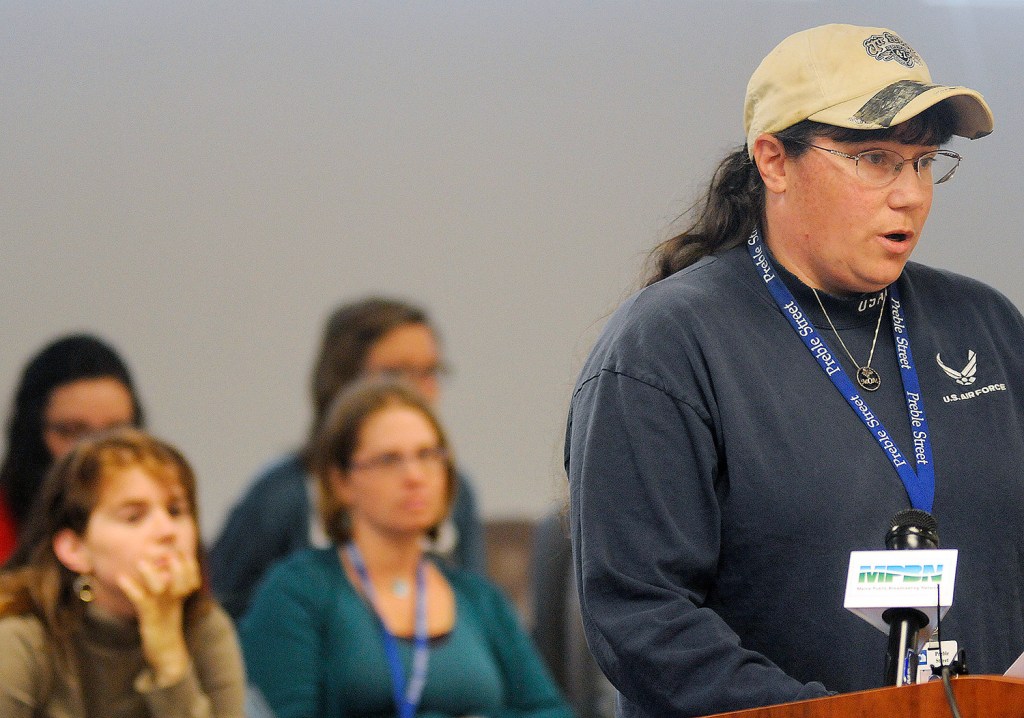AUGUSTA — Thomas Ptacek credits food stamps with stabilizing his life and putting him on the path toward self-sufficiency.
“I’m standing here today, working full time, making decent money, paying off a good and reliable car, investing in my future, taking on a hobby that makes me feel good, all because the (food stamp) program was a consistent and dependable part of my progress back to a fulfilling life,” said Ptacek, 48, of Portland.
Ptacek spoke at a public hearing Tuesday to take public comment on a plan to reinstate an asset test to qualify for food stamps, which the state abandoned in 2010. About 30 people attended the State House hearing.
The test would require that families without children have no more than $5,000 in total assets, including bank accounts, snowmobiles, recreational vehicles and ATVs, in order to qualify.
Homes and a household’s primary vehicle are exempt from the test. Food stamps, also known as the Supplemental Nutritional Assistance Program, are funded entirely by the federal government. While Maine won’t save state taxpayer money with the change, the asset test is part of the LePage administration’s attempt to reform the welfare system by tightening eligibility requirements.
Maine Department of Health and Human Services officials have said that food stamps should be a last resort, and the program is not intended for people who have the means to buy their own groceries.
But critics say the asset test would be a disincentive to savings and keep low-income people from climbing into the middle class.
“Research shows that assets are crucial to helping families escape poverty and climb the economic ladder,” said Ann Woloson, policy analyst for Maine Equal Justice Partners, an Augusta-based advocacy group.
Ptacek said if he lost his job, ended up back on food stamps and had to sell down his possessions in order to qualify, it would threaten his mental health.
“I would like the possibility of roughly being able to pick up where I left off,” Ptacek said. “Being forced to take more steps backwards in order to get help moving forwards doesn’t make sense.”
But an example that Ptacek used, having to sell his guitars, would not be part of the asset test, a DHHS official said.
“Personal items, like guitars, are exempt,” said David Sorensen, a spokesman for the department. “Most Mainers recognize this as a common sense welfare reform.”
Although DHHS took comments on the rule change, the LePage administration intends to implement the new rule in the coming weeks.
Meanwhile, state Rep. Scott Hamann, D-South Portland, is proposing a bill that would repeal the new asset test.
“The proposed solution to poverty in our state is to make every hungry person seeking food assistance prove they don’t own a yacht,” Hamann said at the hearing. “This effort does nothing to move people out of poverty, it does nothing to improve the efficacy of our social safety net for our most vulnerable, and it does nothing to save Maine taxpayers one penny.”
A total of 200,896 Mainers were receiving food stamps as of August, and 8,600 of them would be affected by the rule, according to DHHS. The state has not estimated what percentage of the 8,600 would fail the asset test.
While most at the hearing testified against the new rule, Beth Drugach of Saco said she sees abuses in the system, and that people should sell their assets before asking for food stamps.
“I don’t have a camper and I don’t have a boat because I can’t afford it,” she said.
All states had to test for assets until the federal government allowed states to waive the asset test in 2002. After the recession hit in 2008, Maine and 35 other states did away with the asset test. When the test is reinstated in a few weeks, Maine will be the only state in the Northeast to have an asset test.
Send questions/comments to the editors.




Success. Please wait for the page to reload. If the page does not reload within 5 seconds, please refresh the page.
Enter your email and password to access comments.
Hi, to comment on stories you must . This profile is in addition to your subscription and website login.
Already have a commenting profile? .
Invalid username/password.
Please check your email to confirm and complete your registration.
Only subscribers are eligible to post comments. Please subscribe or login first for digital access. Here’s why.
Use the form below to reset your password. When you've submitted your account email, we will send an email with a reset code.